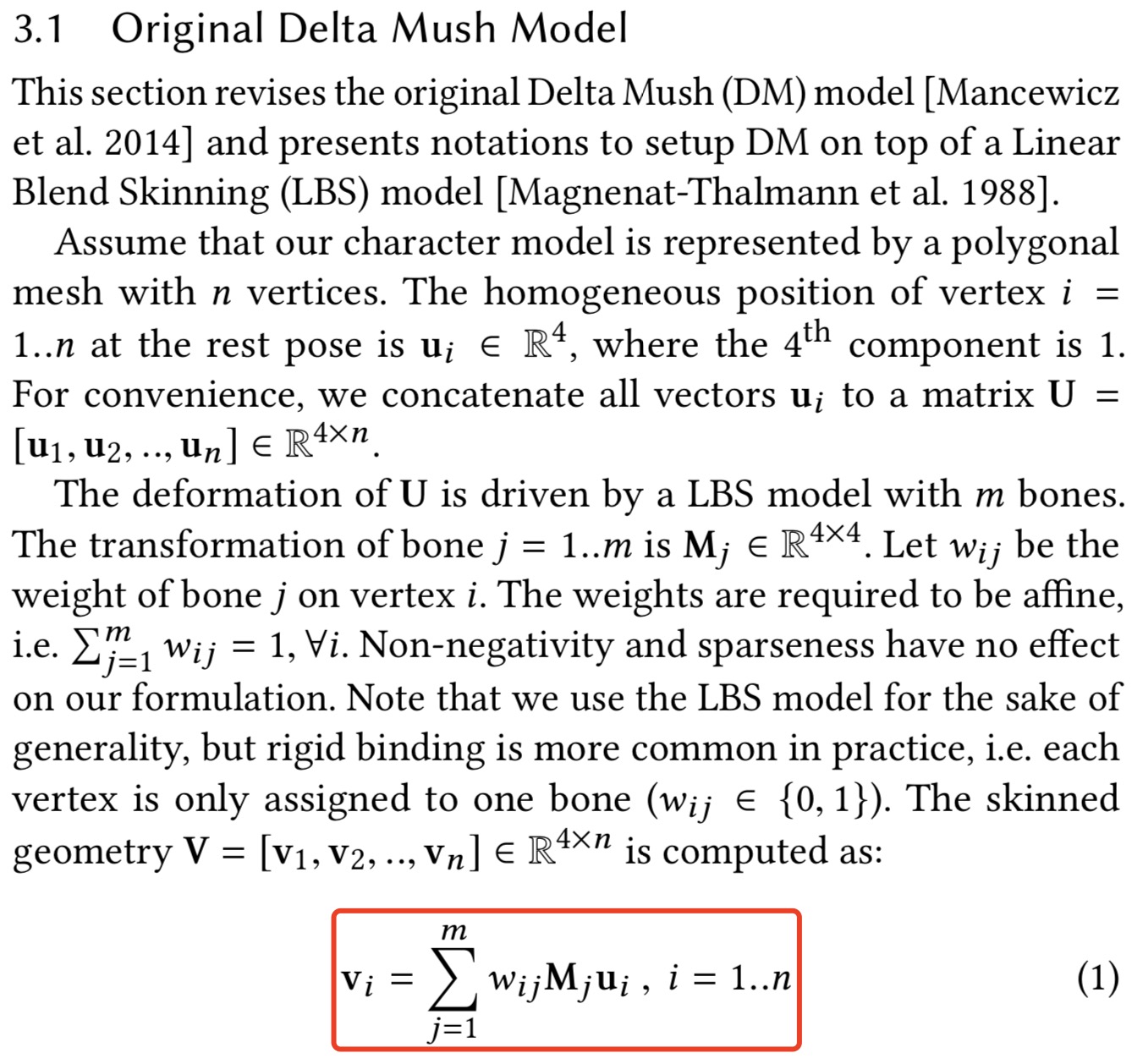An example from Direct Delta Mush Skinning and Variants Eq. 1
The original equation:

I❤️LA implementation:
v_i = ∑_j w_i,j M_j u_i
where
w ∈ ℝ^(n×m)
M_j ∈ ℝ^(4×4)
u_i ∈ ℝ^4I❤️LA compiled to C++/Eigen:
/*
v_i = ∑_j w_i,j M_j u_i
where
w ∈ ℝ^(n×m)
M_j ∈ ℝ^(4×4)
u_i ∈ ℝ^4
*/
#include <Eigen/Core>
#include <Eigen/Dense>
#include <Eigen/Sparse>
#include <iostream>
#include <set>
struct delta_mush_1ResultType {
std::vector<Eigen::Matrix<double, 4, 1>> v;
delta_mush_1ResultType(const std::vector<Eigen::Matrix<double, 4, 1>> & v)
: v(v)
{}
};
delta_mush_1ResultType delta_mush_1(
const Eigen::MatrixXd & w,
const std::vector<Eigen::Matrix<double, 4, 4>> & M,
const std::vector<Eigen::Matrix<double, 4, 1>> & u)
{
const long n = w.rows();
const long m = w.cols();
const long dim_0 = M.size();
const long dim_1 = u.size();
assert( w.rows() == n );
assert( dim_0 == m );
assert( dim_1 == n );
std::vector<Eigen::Matrix<double, 4, 1>> v(dim_1);
for( int i=1; i<=dim_1; i++){
Eigen::MatrixXd sum_0 = Eigen::MatrixXd::Zero(4, 1);
for(int j=1; j<=M.size(); j++){
sum_0 += w(i-1, j-1) * M.at(j-1) * u.at(i-1);
}
v.at(i-1) = sum_0;
}
return delta_mush_1ResultType(v);
}
void generateRandomData(Eigen::MatrixXd & w,
std::vector<Eigen::Matrix<double, 4, 4>> & M,
std::vector<Eigen::Matrix<double, 4, 1>> & u)
{
const int n = rand()%10;
const int dim_1 = n;
const int m = rand()%10;
const int dim_0 = m;
w = Eigen::MatrixXd::Random(n, m);
M.resize(dim_0);
for(int i=0; i<dim_0; i++){
M[i] = Eigen::MatrixXd::Random(4, 4);
}
u.resize(dim_1);
for(int i=0; i<dim_1; i++){
u[i] = Eigen::VectorXd::Random(4);
}
}
int main(int argc, char *argv[])
{
srand((int)time(NULL));
Eigen::MatrixXd w;
std::vector<Eigen::Matrix<double, 4, 4>> M;
std::vector<Eigen::Matrix<double, 4, 1>> u;
generateRandomData(w, M, u);
delta_mush_1ResultType func_value = delta_mush_1(w, M, u);
std::cout<<"vector return value:"<<std::endl;
for(int i=0; i<func_value.v.size(); i++){
std::cout<<"i:"<<i<<", value:\n"<<func_value.v.at(i)<<std::endl;
}
return 0;
}I❤️LA compiled to Python/NumPy/SciPy:
"""
v_i = ∑_j w_i,j M_j u_i
where
w ∈ ℝ^(n×m)
M_j ∈ ℝ^(4×4)
u_i ∈ ℝ^4
"""
import numpy as np
import scipy
import scipy.linalg
from scipy import sparse
from scipy.integrate import quad
from scipy.optimize import minimize
class delta_mush_1ResultType:
def __init__( self, v):
self.v = v
def delta_mush_1(w, M, u):
w = np.asarray(w, dtype=np.float64)
M = np.asarray(M, dtype=np.float64)
u = np.asarray(u, dtype=np.float64)
n = w.shape[0]
m = w.shape[1]
dim_0 = M.shape[0]
dim_1 = u.shape[0]
assert w.shape == (n, m)
assert M.shape == (dim_0, 4, 4)
assert u.shape == (dim_1, 4, )
assert dim_0 == m
assert dim_1 == n
v = np.zeros((dim_1, 4, ))
for i in range(1, dim_1+1):
sum_0 = np.zeros((4, ))
for j in range(1, len(M)+1):
sum_0 += w[i-1, j-1] * M[j-1] @ u[i-1]
v[i-1] = sum_0
return delta_mush_1ResultType(v)
def generateRandomData():
n = np.random.randint(10)
dim_1 = n
m = np.random.randint(10)
dim_0 = m
w = np.random.randn(n, m)
M = np.random.randn(dim_0, 4, 4)
u = np.random.randn(dim_1, 4, )
return w, M, u
if __name__ == '__main__':
w, M, u = generateRandomData()
print("w:", w)
print("M:", M)
print("u:", u)
func_value = delta_mush_1(w, M, u)
print("return value: ", func_value.v)I❤️LA compiled to MATLAB:
function output = delta_mush_1(w, M, u)
% output = delta_mush_1(w, M, u)
%
% v_i = ∑_j w_i,j M_j u_i
%
% where
%
% w ∈ ℝ^(n×m)
% M_j ∈ ℝ^(4×4)
% u_i ∈ ℝ^4
if nargin==0
warning('generating random input data');
[w, M, u] = generateRandomData();
end
function [w, M, u] = generateRandomData()
n = randi(10);
dim_1 = n;
m = randi(10);
dim_0 = m;
w = randn(n, m);
M = randn(dim_0,4,4);
u = randn(dim_1,4);
end
n = size(w, 1);
m = size(w, 2);
dim_0 = size(M, 1);
dim_1 = size(u, 1);
assert( isequal(size(w), [n, m]) );
assert( isequal(size(M), [dim_0, 4, 4]) );
assert( isequal(size(u), [dim_1, 4]) );
assert( dim_0 == m );
assert( dim_1 == n );
v = zeros(dim_1, 4);
for i = 1:dim_1
sum_0 = zeros(4,1);
for j = 1:size(M, 1)
sum_0 = sum_0 + w(i, j) * squeeze(M(j,:,:)) * u(i,:)';
end
v(i,:) = (sum_0)';
end
output.v = v;
end
I❤️LA compiled to LaTeX:
\documentclass[12pt]{article}
\usepackage{mathdots}
\usepackage[bb=boondox]{mathalfa}
\usepackage{mathtools}
\usepackage{amssymb}
\usepackage{libertine}
\DeclareMathOperator*{\argmax}{arg\,max}
\DeclareMathOperator*{\argmin}{arg\,min}
\usepackage[paperheight=8in,paperwidth=4in,margin=.3in,heightrounded]{geometry}
\let\originalleft\left
\let\originalright\right
\renewcommand{\left}{\mathopen{}\mathclose\bgroup\originalleft}
\renewcommand{\right}{\aftergroup\egroup\originalright}
\begin{document}
\begin{center}
\resizebox{\textwidth}{!}
{
\begin{minipage}[c]{\textwidth}
\begin{align*}
\mathit{v}_{ \mathit{i} } & = \sum_\mathit{j} \mathit{w}_{\mathit{i}, \mathit{j}}\mathit{M}_{ \mathit{j} }\mathit{u}_{ \mathit{i} } \\
\intertext{where}
\mathit{w} & \in \mathbb{R}^{ \mathit{n} \times \mathit{m} } \\
\mathit{M}_{\mathit{j}} & \in \mathbb{R}^{ 4 \times 4 } \\
\mathit{u}_{\mathit{i}} & \in \mathbb{R}^{ 4} \\
\\
\end{align*}
\end{minipage}
}
\end{center}
\end{document}
I❤️LA LaTeX output: